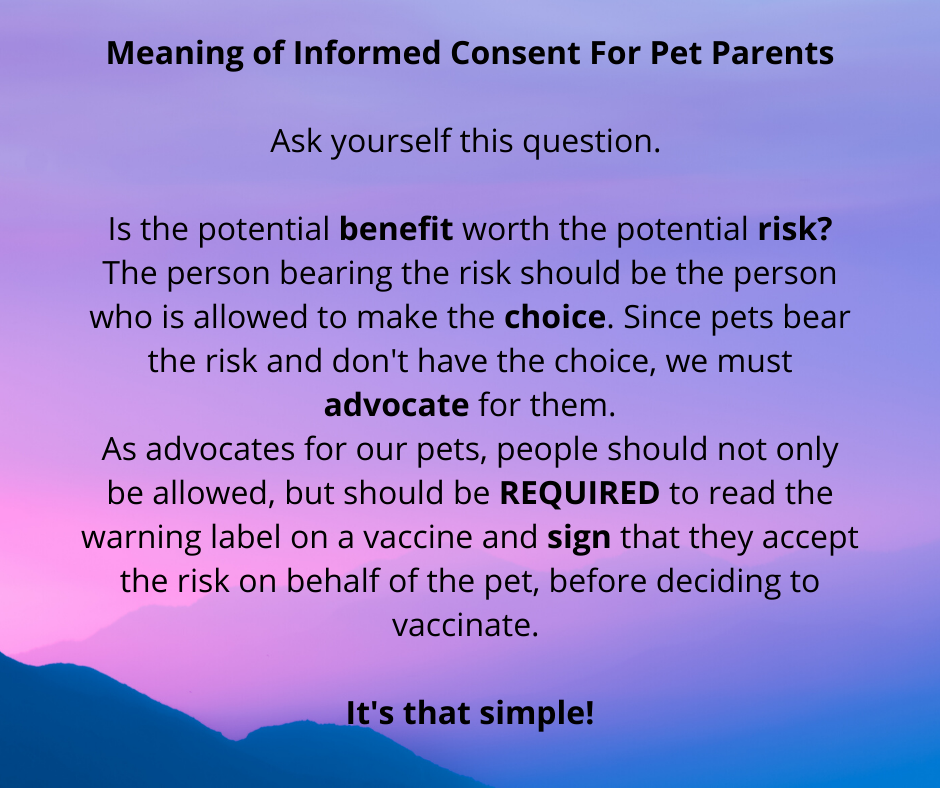Dog Vaccinations Pros and Cons
The topic of dog vaccinations is a real can of worms. There are good arguments for, and good arguments against vaccinating dogs. The vaccine pros and cons conversation rages! Let's not fight!
 He doesn't look very happy about this, does he? He also doesn't have a choice, but YOU do!
He doesn't look very happy about this, does he? He also doesn't have a choice, but YOU do!Have you ever considered the possibility that dog vaccinations do more harm than good? Some holistic veterinarians today, are saying that dog vaccines are the leading cause of other dog health problems.
I fully understand and agree, that you must protect your dogs from serious disease. However, what is the downside? What are the dangers of vaccines and what vaccine side effects will your dog have to endure? In order to be protected for life will your dog sustain permanent vaccine injury potentially causing other more chronic dog health concerns as your dog ages. Herein lies the vaccine controversy! Is the potential damage ( risk ) greater than the potential benefit gained?
Required Vaccines for Dogs?
Whatever you think, all dogs must be
given the rabies vaccine. This is the law in all states and Canadian provinces. Other canine vaccines are NOT required by law. So please know this and make your decision understanding that you have the right to choose whether to give your dog the recommended ' canine core vaccines ' and others, or not.
Puppy shots are given at varying intervals when the animal is young, and then yearly or every three years, after that. Over the course of your dog’s lifetime, that is a lot of dog vaccinations.
What Exactly is In Dog Vaccinations?
A little bit of the disease of course, which forces your dog's body to mount an immune response and build up antibodies. So what's the big deal? Here's the problem.
Usually, dogs are given ' vaccine cocktails '. This is like hitting your dog's immune system with a sledge hammer. Too much for the immune system to deal with at once, can send the immune response into hyper-drive, causing the immune system to over react to things it wouldn't normally react to.
An option you may want to consider, is to give dog vaccinations one at a time, while at the same time, your dog is given adequate time in between to recover from any possible adverse vaccine side effects. This may be especially important for very young puppies, and small dogs under 20 lbs. You can ask your vet about this. this. It might cost more though.
Here is the list of ' core vaccines ' considered most necessary.
- parvovirus vaccine
- distemper vaccine
- adenovirus vaccine
There are also other toxic chemicals and compounds used in dog vaccines to preserve, stabilize and increase the vaccine effectiveness and strength. These added ingredients called ' Adjuvants ' includes things like...
- formaldehyde - a chemical gas is used as a preservative
- mercury - ethylmercury contained in Thimersol is used as a preservative against pathogens such as bacteria an fungus.
- aluminum - various aluminum compounds are used in vaccines to boost the immune system response
- antibiotics - are often included to prevent bacterial contamination
What to Know About Dog Vaccination Doses?

No it doesn't! One size DOES NOT fit all, but here's the reasoning. All dogs, regardless of size, are exposed to the same risk of disease and therefore require the same amount of vaccine.
Typically, the vaccine dose is given by syringe subcutaneously ( under the skin ), or into the muscle, sprayed into the nostrils ( Kennel Cough ) or taken orally by mouth.
My concern is for small dogs because the risk of vaccine side effects and potential vaccine injury increases exponentially. All dogs regardless of size receive the same amount of vaccine.
So it doesn't matter if your dog weighs 6 lbs or 160 lbs, the dose is the same. All dogs are required to get 1 ml of vaccine regardless of the size of the dog.
This is especially dangerous when it comes to the vaccine adjuvants added to the vaccine formulation. Small dogs will get the same amount of toxic chemical compounds, preservatives and heavy metals as bigger dogs. This is not good.
Vaccine Side Effects
The side effects of vaccines can start to be noticed within 24 hours. If you choose
to vaccinate, keep your eyes open for noticeable changes that can
include these other dog health problems.
- lack of appetite, no interest in eating
- lethargy, low energy
- fever, he feels hot or swollen somehere on the body
- organ inflammation, pancreatitis
- stiff sore joints
- allergy flare up
- skin breakouts
- bleeding gums
- seizures
- red inflammed bump at the injection site
- digestive upset, vomiting, diarrhea
- hind end muscle weakness
- behavioral problems, aggression, destructve behavior, separation anxiety
Of course all of these things can be symptoms of other dog health problems too, but if they occur within 72 hours, and up to 3 months after your dog has been vaccinated, I would be suspicious. Vaccine side effects are notoriously under reported, so the incidence of vaccine related illness is much higher than you might be aware of. It pays to do your homework on this topic.
What is the Best Dog Vaccination Schedule?
Originally, dog vaccinations were intended to do good. Over the last few decades animal vaccines have become a multi- billion dollar industry. This is now big business like any other.
Veterinarians, although they have the best of intentions, have shared in the profits. What about annual re-vaccinations? What a great source of residual income. Nothing wrong with making money, but to what detriment? More sick dogs?
Click here to watch Dr. John Robb speak about the vaccine controversy and his position on it.
So now what? Although I cannot tell you to stop vaccinating your dog, it would seem wise to keep the use of dog vaccinations to a bare minimum. The most up to date information available assures us that vaccine protection will last a minimum of 5 years and very likely longer. Here's a great page to help you decide upon an effective dog vaccination schedule.
Your Dog's Best Advocate is...YOU!

Strive for the best health you can give your dog naturally.
You can boost your dog's immune response by providing the best dog food you can afford.
Use daily nutritional health supplements to keep your dog's own immune system strong and functioning optimally.
Search for a vet who will work with you to explain both the benefits and risks of dog vaccinations. A responsible veterinarian would never vaccinate a sick animal. You might have to shop around for a vet you can work with. Find one who cares enough to talk with you about vaccinating your dog.
I speak to many hundreds of people every month with sick dogs. So I may have a different perspective on this dog vaccine controversy, than you do. However, as always, my intention is to help you make the best informed decision for your dog.
Informed Consent
Permission granted in the knowledge of the possible consequences, typically that which is given by a patient to a doctor for treatment, with full knowledge of the possible risks and benefits.
New! Comments
Have your say about what you've just read here. Use the comments box below.
Sharing is appreciated!

